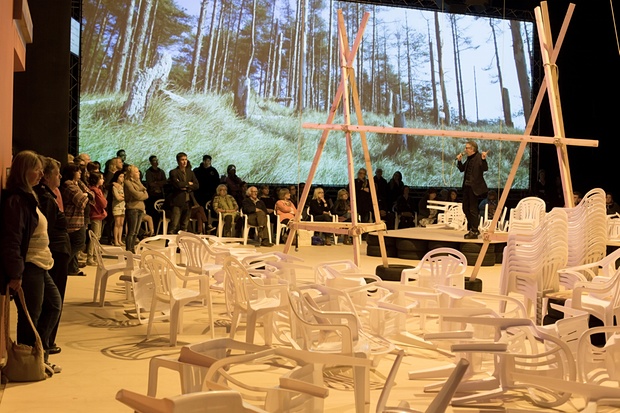
A guest review by 3rd Act Critic Brian Roper
ILIAD.
National Theatre Wales
Ffwrnes Theatre, Llanelli, 26 September 2015A bright autumn day in Llanelli grew even brighter as National Theatre Wales’ marathon production of the Iliad opened to an enthusiastic audience.
But there was something else going on that day. At 10.00 am the town was already buzzing with match-day fever as the first pints were evident and on Stryd Stepney, Max and Cerys belted out the old tunes. How would art fare in competition with rugby in this hotbed of the game? Rather well as it turned out.
In four parts this ancient tale was always likely to be epic, but it was never boring.
Directors Pearson and Brookes have previous, (Coriolanus, The Persians), and this multi-media staging of Logue’s War Music, itself derived from Homer’s account of the end of the Trojan War, is up there.
As you would expect the sound is compelling, always haunting it was at times almost wistful but the potential for bellicosity and pent-up violence was always present.
The projections range from largely static landscapes (in Wales?) which, whilst charming, seemed to be a long way from the Eastern Mediterranean and video headshots of local teenagers playing Gods.
A team of six narrators carried the three hundred pages of poetry with aplomb, all were convincing. Daniel Hawksford made a strong early showing and Richard Lynch grew into his roles but Melanie Walters stood out with her diction and accents and her acting through gesture and her facial projection.
The use of teleprompters restricted dramatic potential to the use of the upper body and engendered a sense of “talking heads” which diverted the attention of the audience away from the action and on to the screen, it seemed a bit like talking with friends in a pub with the TV on and finding that the usual dynamic cannot be established. Such an approach demands good tone and timbre in the voice and clear diction and enunciation which was provided on a consistent basis but the strongest effects came when the cast performed in choirs, as in the death of the bull sequence which was deeply moving.
The language conveyed the message. The elision of the ancient (7th century B.C.) and the modern and of the catastrophic and continuing threat of war, conflict and displacement, was conveyed admirably and the references to “helicopters”, ”privatise”, ”Australia” and “curly-girlie hair” could have disorientated, but did not.
NTW is good at sets and settings.The opened floor of the Ffwrnes theatre was a blank page and the weight of the production therefore fell on the set.
Think Kwikfit tyre bay meets a clearance sale at the garden centre.
I never appreciated how many uses plastic stacking chairs could be put to.
At its best it was outstanding, occasionally it was prosaic and sometimes it was plain irritating.
Building the set as you go along invites the audience to care and to share in the process and whilst some of the effects, like the raising of giant blooms on tripods were certainly dramatic, in the manner of raising the US flag on Iwo Jima, they also seemed to be rather pointless and distracting.
Audience engagement also involved being ushered around the space to make way for yet another “construction”, the audience becoming the set and, more welcomingly for the chosen few, being invited to lie down and play dead.
The marathon was sold out and as part four started the England v Wales rugby game kicked off. But the “literati”, as I heard us being described by a passing rugby fan (who must himself have been somewhat literate) were loyal to the cause. I recognised many who had been there at 10.30 that morning.
I asked our National Poet, Gillian Clark, for her opinion, she said” Tonight was so inspiring…it showed such respect for language…this was the NTW at its best.”
It was a marathon and it was epic. The concluding sound-scene with hunting horn and battle drums stayed with me as I scurried away from the theatre not wishing to overhear the rugby score, and made my way home on the M4, without the radio on, for the same reason. The sound of battle and desolation and of loss is with me now.
This was not just drama. It was arresting and compelling, a ”must-experience” experience.
The standing ovation was testimony to the power of this production and to the tenacity of the audience and I was delighted to be with them.
Brian Roper
27/09/2015
